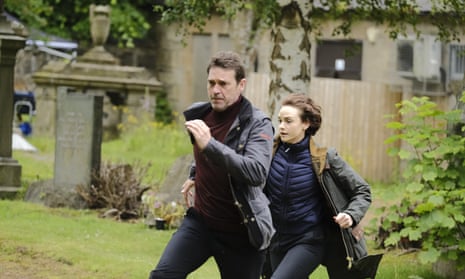The biggest surprise of Crime, BritBox’s much-heralded new drama by Irvine Welsh, is that – particularly as far as the opening episode is concerned – it could have been written by anyone.
It’s set in Edinburgh, sure, and the protagonist – DI Ray Lennox (Dougray Scott) – is a drink and drug addict in recovery, but, beyond these touchstones of the Trainspotting author, it plays as a wholly pedestrian police procedural (although by the end of the six episodes Welsh has at least pushed the limits of what we normally see from the troubled detective at the centre of such shows).
Lennox becomes the lead investigator in the case of a missing child, Britney Hamil. The seven-year-old has been snatched in a CCTV blind spot by a man and bundled into his white van, her fate revealed in a hauntingly beautiful and awful scene on Calton Hill at the National Monument in the closing moments of the first episode. The suspects are Britney’s grandfather (who “beasted” – molested – Britney’s mother when she was young) and her father, a local sex offender, both of whom are traced and dismissed. Lennox becomes increasingly convinced that Britney was taken by a killer called Mr Confectioner, who was responsible for the disappearance of several girls before he was caught and imprisoned. Lennox thinks the police got the wrong man. Is he right? Or is he blinkered, driven not by evidence but by whatever demons also drove him to addiction, and which were born – if his unbidden flashbacks are anything to go by – of unspeakable events in his childhood?
It is not, of course, Welsh’s fault that – bar the occasional dramatisation of Lennox’s inner wish to scream in his superiors’ faces – there is none of the stylistic flair with which Welsh’s output is often linked, thanks to Danny Boyle’s Trainspotting. However, this means there is little to offset the disappointment offered by the conventional nature of the narrative. Bob (Ken Stott), Lennox’s boss and chief superintendent, is resistant to plausible theories and viable suspects to the point of idiocy, which is as frustrating and wearying to the viewer as ever.
Meanwhile, Lennox’s sidekick Amanda (Joanna Vanderham) is an underwritten cipher, there to stand up to the old guard’s unthinking sexism and show that the programme makers had heard of #MeToo. Angela Griffin finds herself in a similar position as Lennox’s girlfriend, Trudi, burdened by a sexual harassment subplot untethered to the main, and lumbered with lines that seem to have been copied directly from a corporate handbook on the subject.
Having watched the whole thing, I can tell you that things become a little more excessive and exuberantly Welshian during the last couple of episodes, but it’s a dreich and plodding affair till then, and not terribly innovative after that.
It is leavened, in a way, by fellow detective, and Begbie-lite figure, Dougie (Jamie Sives), who is investigating the deaths of a French couple – which may or may not intersect with Lennox’s case – but he seems to belong to a totally different production.
The script is odd, too. When not simply banal – with repetitive assertions of how much Lennox hates “beasts”, and Mr Confectioner specifically (“This man was pure. Unadulterated. Evil”) – it hammers home its chosen themes (“Some men can’t handle strong powerful women,” Trudi’s friend says to her at one point). Elsewhere, it strains for the kind of operatic effect that worked so well in the heightened celluloid world of Trainspotting and in Welsh’s written worlds. Here, the effect is merely absurd – not least in the opening voiceover, when Scott ponderously intones that the “ignorance of monsters is bliss … but the road to hell is paved with ignorance”.
Besides, some of the dialogue is just deathly. “More often than not they’ll target kids from single-parent families,” Lennox says to Amanda, with his serial-killer-expert hat on. “Why’s that?” she asks, even though everyone in the world knows. “There’s a higher chance of chaos impeding the investigation from the start,” he replies. “Bit of a stereotype,” she says. “But it makes sense.” I’m glad that’s all cleared up and boilerplated.
Some decidedly ropey performances don’t help anything, but I am aware that it is at least partly disappointment speaking. As a Welsh fan, you have high hopes for anything that comes from his pen, and the prospect of a self-adaptation of one of his books raised them, perhaps unsustainably. Ignore the name and the potential and it’s a serviceable cop show. It’s the waste that feels like a crime.

Comments (…)
Sign in or create your Guardian account to join the discussion